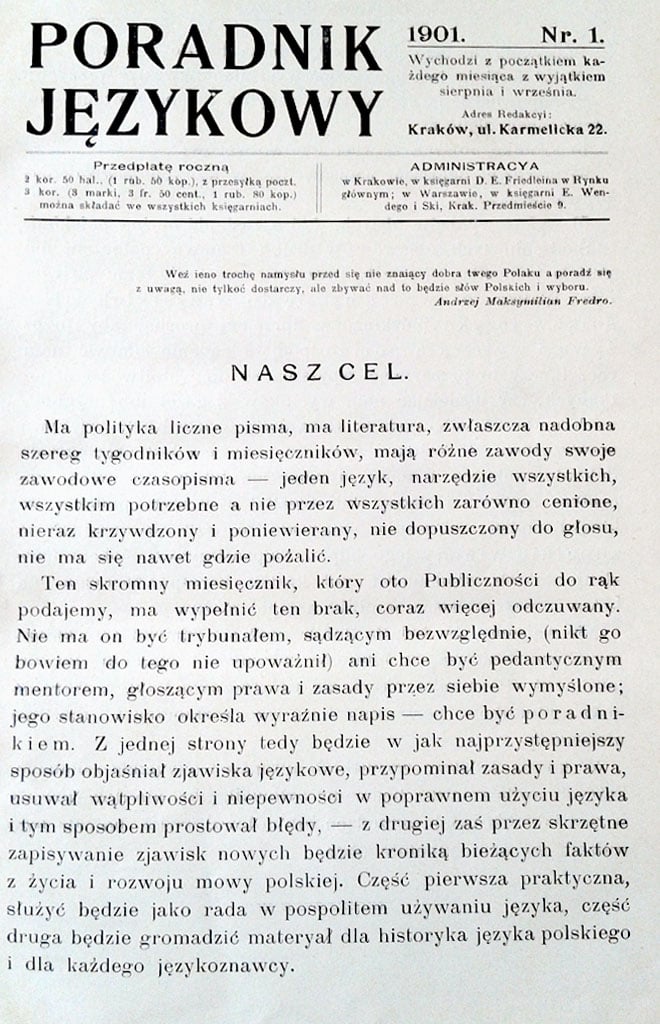VI. The main concept of Poradnik Językowy

When analysing the bibliography of the contents of Poradnik Językowy, it should be concluded that “everything has already been dealt with...”. This is true – in fact, there is no major subject concerning the Polish language in terms of Polish linguistics that has not been commented on in the journal. Obviously, these comments are not universal, and therefore some topics recur in subsequent annual bound volumes, discussed by other authors and approached with different methods.
New research areas, sub-disciplines, innovative or trendy methodologies emerge as well. The recent novelties in Poradnik Językowy include: topics related to rhetoric, translation studies and pragmatics – presented only occasionally so far, yet significant due to the art of the word; topics related to online communication – as a kind of “a sign of the times”; broadly understood public communication (propaganda, persuasion, advertising, language of the press and politics, language of religion, the ethics of the word) – as a manifestation of concerns about the condition of the contemporary Polish language community. As far as linguistics is concerned, its areas, such as semantics, syntax, stylistics and sociolinguistics have become present again in the journal, yet in a new methodological form. Therefore, Poradnik Językowy can be said to have been a regular record of changes and achievements in Polish linguistics and related disciplines.
Witold Doroszewski would define the main driving force behind the publication of Poradnik Językowy – in a manner typical of him, which can be now considered perhaps too pathetic – as follows:
Asnyk wrote in one of his poems:
“Those dependent on ephemeral fads will perish,
So will conjurers seeking fame,
But noble thoughts will prevail forever.”*
The awareness of sharing responsibility for the fate of one’s environment is one of such noble thoughts. And this awareness inspired Zawiliński, whose work deserves to be recognised by Polish people. Work on the language is promoted nowadays as being strictly linked with work on the mental culture of the society by the Society for the Language Culture and Poradnik Językowy – as its body.
Thirty years later, J. Puzynina said in her speech referring to the word of Czesław Miłosz, delivered at a conference organised to celebrate 100 years of existence of Poradnik Językowy, as follows:
I have chosen this topic thinking about Poradnik Językowy as a journal which – for many years – has safeguarded the Polish language against “croaking”, “gibbering” and “burbling” through texts of numerous authors, among whom Roman Zawiliński and Witold Doroszewski need to be particularly recognised, which has promoted the important issue of language awareness, which covers also the human’s attitude to the reality, the truth, which has let express their ideas by those who reflect on meanings of important words and show relationships between language and the human soul, between language and beauty, and between language and morality. All this can be found in the exceptional – and so important to people living in our times – poems by Miłosz, and all this is focused like in a lens in his “talking” about language and its important speech acts.
In both quotations, two fundamental roles assigned to Poradnik Językowy can be clearly seen: developing language standards and proper, i.e. consistent with language culture and the ethics of the word, standards of social communication, and developing knowledge of the Polish language, without which language culture does not exist. In 1901–1931 and 1932–1939, the former role prevailed, while from 1948 the latter started to gain in importance. Nowadays, it seems that there is a harmonious balance between the two roles played by the journal, as proved by the number of its readers, a broad range of topics discussed in its issues and annual bound volumes, and its position in official (both national and international) ranking lists.
